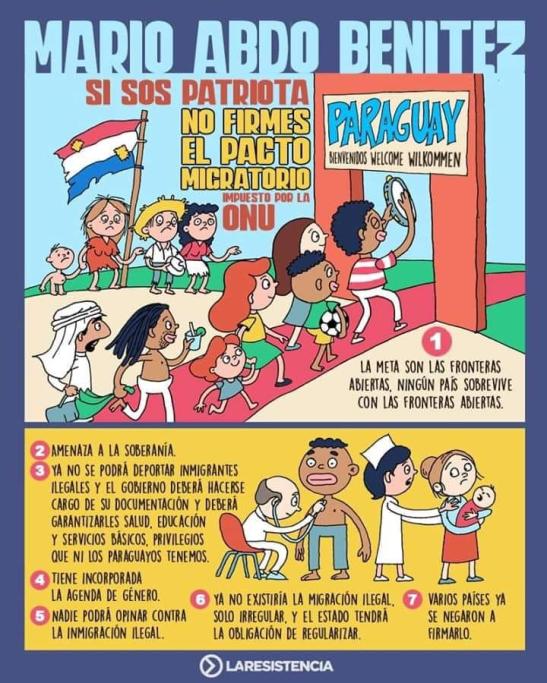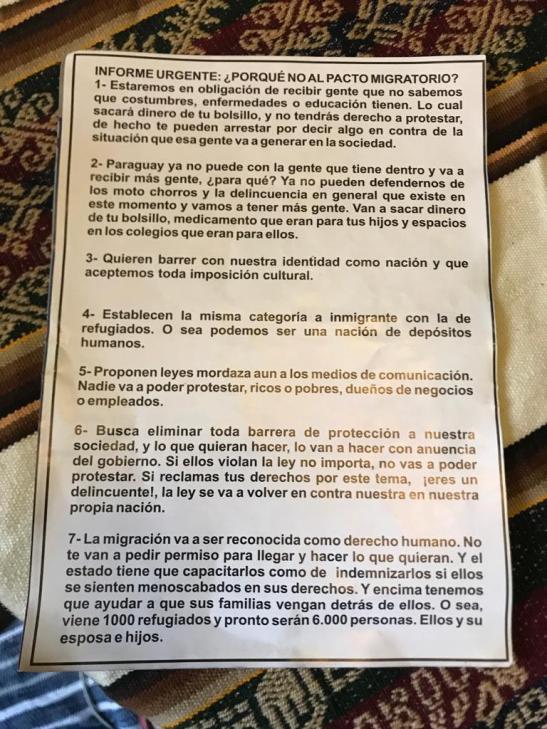Islamophobia in Unlikely Places: Paraguay & the UN Migration Pact
There are only 15,000 Muslims in Paraguay, the overwhelmingly Catholic landlocked South American country with a population of 6 million. And yet, in the last month of 2018, a rapid wave of anti-immigrant and Islamophobic rhetoric derailed international policy and took over social media as the country considered joining the UN Global Compact for Safe, Orderly and Regular Migration. Paraguay is an example of how quickly xenophobic and Islamophobic discourses take hold in the most unlikely places.
On December 6, 2018, the National Pro-Life and Pro-Family Front of Paraguay sent the president a note about the then-upcoming UN meeting in Marrakech where the country would assent to the Global Migration Pact, calling it unconstitutional because it violated Paraguay’s “independence” and “self-determination.” In addition to the violation of sovereignty, the front warned that Paraguay’s taxpayers would be obligated to foot the bill for all sorts of “services for refugees: housing, food, medicine, among others.” But it wasn’t just religion and immigration at play. The No Al Pacto (“no to the pact”) movement also claimed that the agreement would force anti-nuclear family, feminist, and LGBTI-affirming “gender ideology” on unsuspecting Paraguayan youth.
The note caught the government and the public by surprise because the pact was not well-known, but in the next few days, public statements, street protests, press conferences, and videos circulated on WhatsApp diffused a series of arguments against the pact. The Association of Evangelical Churches of Paraguay called the pact “unviable” for its position that Paraguay be required to provide “sexual and reproductive health that includes abortion and gender ideology.” The Ministry of Foreign Relations countered that the pact would not require Paraguay to change its laws on reproductive health. Moreover, afterwards Paraguay’s exasperated Foreign Minister explained “Paraguay didn’t sign anything. This document serves as a reference point and nothing more.”
Racially tinged memes, dubious videos of violent African and Middle Eastern men in Europe, menacing descriptions of sharia law and sexual assault—many coming explicitly from Russian sources—dominated public discourse in a pattern all-too-familiar to refugee and immigration advocates. This popular pamphlet shows a  sketch (racially problematic) of foreigners receiving care while poor Paraguayans are rejected and says “The goal is open borders. No country survives open borders” and even “No one would be able to opine against illegal immigration.”
sketch (racially problematic) of foreigners receiving care while poor Paraguayans are rejected and says “The goal is open borders. No country survives open borders” and even “No one would be able to opine against illegal immigration.”
But Paraguay depends on the remittances of nearly 2 million migrants in Argentina and Spain and beyond, where many work without proper documents. Remember, Paraguay only has a population of 6 million. And the most the populous Paraguayan city isn’t even in Paraguay. It’s Buenos Aires, where nearly 1 million Paraguayans live.
Despite the strong support from Pope Francis, the small Paraguayan evangelical protestant “pro-life” and “pro-family” front has been able to set the debate on the UN Migration Pact in terms of invasion, an unending caravan of black and brown bodies carrying diseases and contagious religious beliefs. Paraguay is a predominantly racially-mixed, mestizo country where the vast majority of Paraguayans have indigenous ancestry and many have Afro-Paraguayan ancestry. In a sad irony, the pact is designed to protect the very people who are now decrying it.


I doubt that a million Paraguayans live in Buenos Aires proper, which has a population of roughly three million. If you count the suburbs of Gran Buenos Aires, that may well be true.
LikeLike
Today, about 2 million Paraguayans live in the province of Buenos Aires (Argentina), of which some 300,000 are illegal, said the Paraguayan consul of that capital, Jorge Riquelme on this Friday (October 2017). [I translated into English for those who might not read Spanish, but I know you do!]
“Actualmente, viven en la provincia de Buenos Aires (Argentina) alrededor de dos millones de paraguayos, de los cuales unos 300.000 están de forma ilegal, según informó este viernes el cónsul paraguayo en dicha capital, Jorge Riquelme.”
http://www.abc.com.py/nacionales/dos-millones-de-paraguayos-viven-en-baires-1642336.html
LikeLike